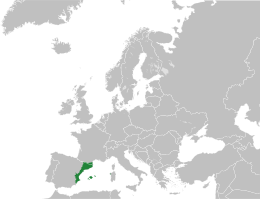Catalan-language
| Catalan | |
|---|---|
| Catalan–Valencian–Balearic | |
| català | |
| Pronunciation |
[kətəˈla] (Eastern) ⁓ [kataˈla] (Western) |
| Native to | Andorra, France, Italy, Spain |
|
Native speakers
|
4.1 million (2012) L2 speakers: 5.1 million in Spain (2012) |
|
Early form
|
|
|
Standard forms
|
Catalan (regulated by the IEC)
|
|
Latin (Catalan alphabet) Catalan Braille |
|
| Signed Catalan | |
| Official status | |
|
Official language in
|
1 country
1 organisation
|
|
Recognised minority
language in |
|
| Regulated by |
Institut d'Estudis Catalans Acadèmia Valenciana de la Llengua |
| Language codes | |
| ISO 639-1 | ca |
| ISO 639-2 | cat |
| ISO 639-3 | |
| Glottolog | stan1289 |
| Linguasphere | 51-AAA-e |
 |
|
Catalan (/ˈkætəlæn/;autonym: català [kətəˈla] or [kataˈla]) is a Romance language derived from Vulgar Latin and named after the medieval Principality of Catalonia, in northeastern modern Spain. It is the national and only official language of Andorra, and a co-official language of the Spanish autonomous communities of Catalonia, including the Balearic Islands and Valencia (where the language is known as Valencian). It also has semi-official status in the commune of Alghero These territories are often called Catalan Countries.
Catalan evolved from Vulgar Latin in the Middle Ages around the eastern Pyrenees. 19th-century Spain saw a Catalan literary revival, culminating in the early 1900s.
The word Catalan derives from the territory of Catalonia, itself of disputed etymology. The main theory suggests that Catalunya (Latin Gathia Launia) derives from the name Gothia or Gauthia ("Land of the Goths"), since the origins of the Catalan counts, lords and people were found in the March of Gothia, whence Gothland > Gothlandia > Gothalania > Catalonia theoretically derived.
...
Wikipedia
